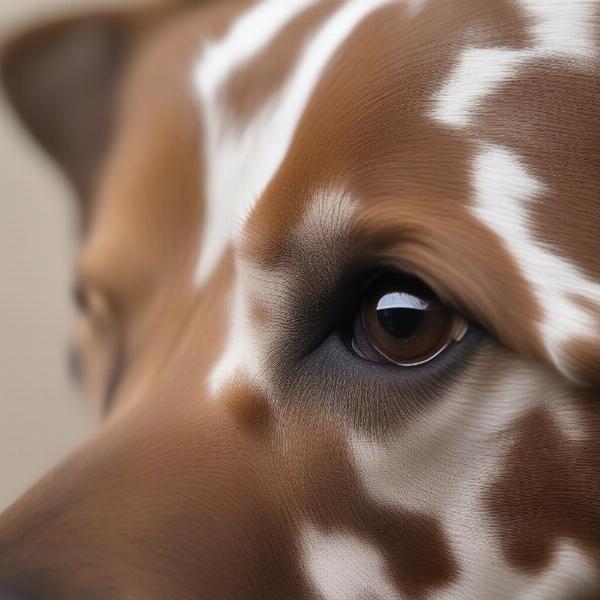Aging spots, also known as lentigines, are a common occurrence in older dogs. These flat, dark spots are similar to freckles or liver spots in humans. While they might look concerning, they’re generally harmless and a natural part of the aging process. This article will delve into the causes, appearance, and when to consult a vet about your dog’s aging spots.
Are those dark spots on your senior dog something to worry about? Most likely not. Aging spots on dogs are typically benign, appearing as flat, pigmented patches on the skin. They’re a normal sign of aging, much like gray hair in humans. However, it’s important to be able to distinguish them from other skin conditions that might require veterinary attention.
What Causes Aging Spots in Dogs?
Aging spots result from an overproduction of melanin, the pigment responsible for skin and hair color. As dogs age, melanin production can become uneven, leading to these concentrated areas of pigmentation. Sun exposure can also contribute to the development of aging spots, especially in dogs with light-colored coats. Certain breeds, such as Golden Retrievers, Labrador Retrievers, and Cocker Spaniels, are more prone to developing aging spots.
 Aging spots on dog skin
Aging spots on dog skin
What Do Aging Spots Look Like?
Aging spots typically appear as small, flat, circular or oval spots. They can vary in color from light brown to black. They’re most commonly found on the dog’s belly, groin, lips, and around the muzzle. While they can increase in number and size over time, they shouldn’t cause any discomfort or itching.
Differentiating Aging Spots from Other Skin Conditions
While aging spots are usually harmless, it’s crucial to differentiate them from more serious skin conditions. Malignant melanoma, a type of skin cancer, can sometimes resemble aging spots. Key differences include irregular shape, rapid growth, raised surface, and inflammation. If you notice any of these characteristics, consult your veterinarian immediately.
When Should I Consult a Vet About Aging Spots?
While aging spots are generally benign, it’s always best to have any new skin growth checked by a veterinarian. They can confirm the diagnosis and rule out other potential issues. This is especially important if the spot is:
- Growing rapidly
- Changing shape or color
- Bleeding or oozing
- Causing your dog discomfort
Managing Aging Spots in Dogs
Aging spots don’t require any specific treatment. However, regular monitoring is recommended. Taking photos of the spots and tracking their size and appearance can be helpful. Protecting your dog from excessive sun exposure can help prevent the development of new spots, especially in breeds prone to them.
Conclusion
Aging spots are a common and generally harmless part of the aging process in dogs. While they don’t require treatment, it’s essential to differentiate them from other skin conditions. Regular monitoring and veterinary check-ups are recommended to ensure your senior dog’s skin health.
FAQ
- Are aging spots painful for dogs? No, aging spots are typically not painful or itchy.
- Can aging spots be removed? While removal is possible, it’s usually not necessary for benign aging spots.
- Do all senior dogs get aging spots? No, not all senior dogs develop aging spots, but they are common.
- Are there any ways to prevent aging spots? Limiting sun exposure can help reduce the risk of developing new aging spots.
- Can aging spots be a sign of cancer? While usually benign, any new skin growth should be checked by a vet to rule out cancer.
- What breeds are most prone to aging spots? Breeds like Golden Retrievers, Labradors, and Cocker Spaniels are more susceptible.
- Do aging spots change over time? They can increase in number and size as the dog ages.
ILM Dog is a leading international online resource dedicated to providing expert advice and information on all aspects of dog care and well-being. From breed selection and puppy care to senior dog health and training, we offer a wealth of practical, trustworthy advice for dog owners worldwide. We specialize in providing guidance on dog breeds, health and medical care, training, nutrition, grooming, and accessories. If you have any questions or need assistance, please don’t hesitate to contact us. Email: [email protected], Phone: +44 20-3965-8624. For more helpful tips and resources, visit ILM Dog.